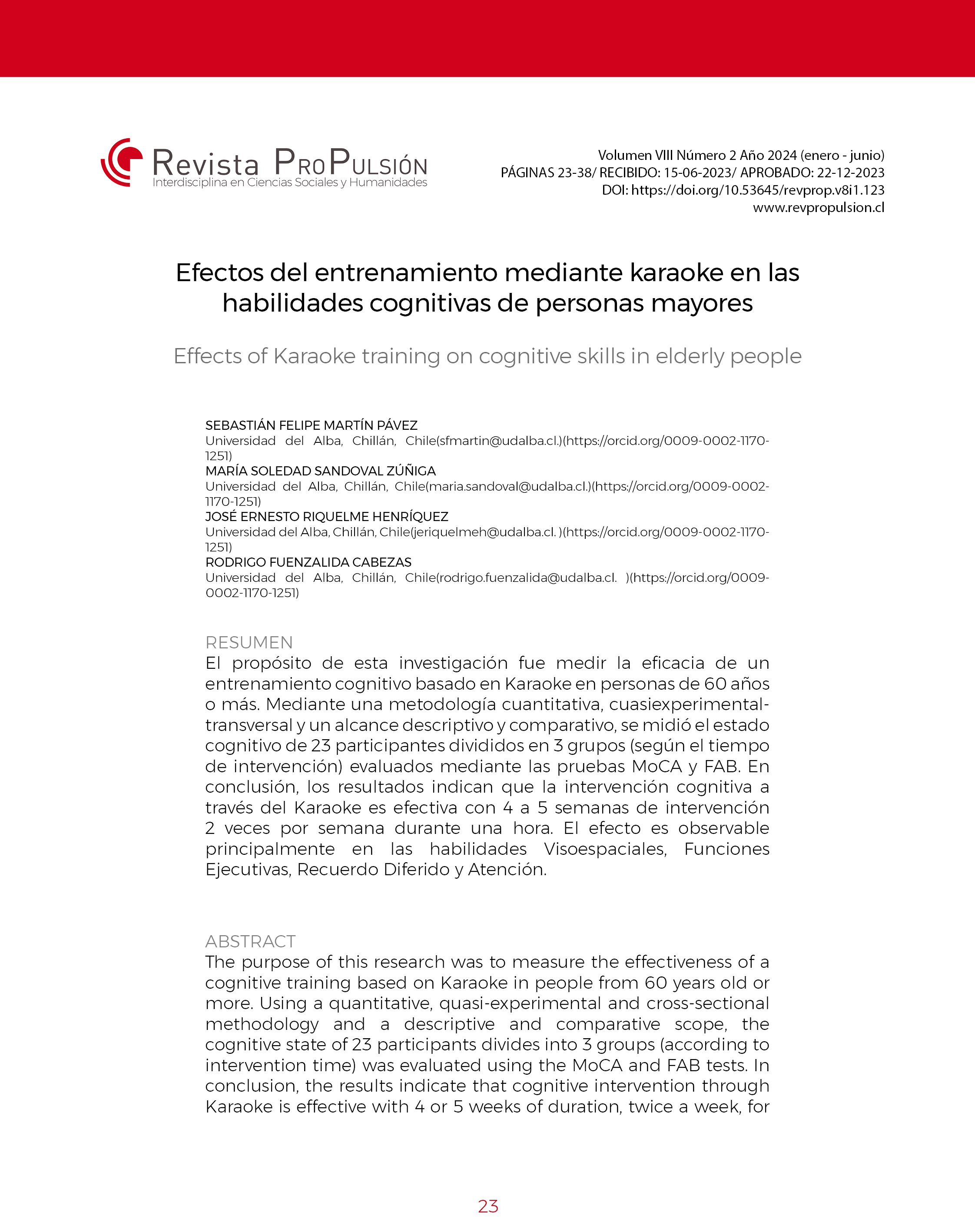Effects of Karaoke training on cognitive skills in elderly people
DOI:
https://doi.org/10.53645/revprop.v8i1.123Keywords:
habilidades cognitivas, karaoke, Moca, Fab, personas mayores, demenciaAbstract
The purpose of this research was to measure the effectiveness of a cognitive training based on Karaoke in people from 60 years old or more. Using a quantitative, quasi-experimental and cross-sectional methodology and a descriptive and comparative scope, the cognitive state of 23 participants divides into 3 groups (according to intervention time) was evaluated using the MoCA and FAB tests. In conclusion, the results indicate that cognitive intervention through Karaoke is effective with 4 or 5 weeks of duration, twice a week, for an hour. The effect is observable mainly in Visuospatial skills, Executive Functions, Delayed Recall and Attention.
Downloads
References
Albala, C. (2020). El envejecimiento de la población chilena y los desafíos para la salud y el bienestar de las personas mayores. Revista. Médica. Clínica las Condes, 31(1), 7-12. https://doi.org/10.1016/j.rmclc.2019.12.001
Alvarado, A y Salazar, A. (2014). Análisis sobre el concepto de envejecimiento. Gerokomos,25(2),1-6.https://dx.doi.org/10.4321/S1134928X2014000200002
American Music Therapy Association. (2023). Music Therapy and Dementia Care: Older Adults with Memory Disorders. Disponible en: file:///C:/Users/ACER/Desktop/Carpeta%20para%20Publicaci%C3%B3n%20karaoke/AMTA%20FactSheet_Music_Therapy_and_Dementia_Care_2021.pdf. Consultado el:13.02.2023.
Celis-Morales, C., Leiva-Ordoñe, A.M., Nazar, G., Albala, C., Troncoso, C. y Cigarroa-Cuevas, I. (2021). El 40% de los casos de demencia podrían ser prevenidos si se modifican factores de riesgo a través del curso de vida. Rev. Méd. Chile [online], 149(1), 152-154. http://dx.doi.org/10.4067/S0034-98872021000100152
Custodio, N., Herrera, E., Lira, D., Montecinos, R., Linares, J. y Benedezú, L. (2012). Deterioro cognitivo leve: ¿dónde termina el envejecimiento normal y empieza la demencia? Anales de la Facultad de Medicina, 73(4), 321-330. Disponible en: http://www.scielo.org.pe/scielo.php?script=sci_arttext&pid=S1025-55832012000400009
Delgado, C., Araneda, A. y Beherens, M. (2017). Validación del instrumento Montreal Cognitive Assessment en español en adultos mayores de 60 años. Sociedad Española de Neurología, 34(6), 376-385. https://doi.org/10.1016/j.nrl.2017.01.013
Diaz, E. y Sosa, A. (2010). Intervención cognitiva en pacientes con deterioro cognitivo ligero y demencia leve. MEDISAN [online], 14(6). Disponible en: http://scielo.sld.cu/scielo.php?script=sci_arttext&pid=S1029-30192010000600015
Dubois, B, Slachevsky A, Litvan I y Pillon B. (2000). The FAB: a Frontal Assessment Battery at bedside. Neurology, 12;55(11):1621-6. https://doi.org/10.1212/WNL.55.11.1621
Dulcey, E y Uribe, C. (2002). Psicología del ciclo vital: hacia una visión comprehensiva de la vida humana Revista Latinoamericana de Psicología, Fundación Universitaria Konrad Lorenz Colombia, 34(1-2), 17-27. Disponible en: https://www.redalyc.org/pdf/805/80534202.pdf
Finkelstein, R. (2018). Salud Sonora: la música nos pone en movimiento y mucho más. National Institute of Health (NIH).
Folstein, M., Folstein, S. y Mchugh, P. (1975). Mini-mental state. A practical method for grading the cognitive state of patients for the clinician. J Psychiatr Res, 12(3), 189-98. https://doi.org/10.1016/0022-3956(75)90026-6
Fuentes, P y Albala, C. (2014). An update on aging and dementia in Chile. Dement Neuropsychol, 8(4):317-322. https://doi.org/10.1590/S1980-57642014DN84000003
García, B. (2007). Bienestar subjetivo y felicidad en la vejez. En: S. Ballesteros (Ed.) Envejecimiento saludable: Aspectos biológicos, psicológicos y sociales. Madrid: Universitas, pp. 273-308. Disponible en: https://dialnet.unirioja.es/servlet/libro?codigo=570341. Consultado el: 23.02.2023.
García, N., Moreno, R. y García, J. (2017). Efecto de la musicoterapia como terapia no farmacológica en la enfermedad de Alzheimer. Revisión sistemática. Rev Neurol, 65(12) 529-38. https://doi.org/10.33588/rn.6512.2017181.
Gómez, M y Gómez, J. (2016). Musicoterapia en la enfermedad de Alzheimer: efectos cognitivos, psicológicos y conductuales, Neurología, 32(5):300-308. https://doi.org/10.1016/j.nrl.2015.12.003
González, F, Buonanotte, F y Cáceres, M. (2014). Del deterioro cognitivo leve al trastorno neurocognitivo menor: avances en torno al constructo. Neurología Argentina, 7(1) 51-58. https://doi.org/10.1016/j.neuarg.2014.08.004
Huenchuan, S. (2018). Envejecimiento, personas mayores y Agenda 2030 para el Desarrollo Sostenible: perspectiva regional y de derechos humanos, Libros de la CEPAL, N°154. Santiago, Comisión Económica para América Latina y el Caribe (CEPAL).
Hugo, F., Rodríguez, L. y Rodríguez, J. (2022). Documento de Trabajo, Envejecimiento en Chile: Evolución, características de las personas mayores y desafíos demográficos para la población. Instituto Nacional de Estadísticas (INE). Subdepartamento de Demografía Departamento de Estadísticas Demográficas y Sociales Subdirección Técnica. Disponible en: https://www.ine.gob.cl/docs/default-source/demografia-y-migracion/documentos-de-trabajo/documentos/envejecimiento-en-chile-evolucion-y-caracteristicas-de-las-personas-mayores.pdf?sfvrsn=b76bd496_4. Consultado el: 16/01/2023.
Jurado-Noboa, C. (2018). La Musicoterapia Neurológica como modelo de Neurorrehabilitación. Rev Ecuat Neurol [online], 27(1). Disponible en: http://scielo.senescyt.gob.ec/scielo.php?pid=S2631-25812018000100072&script=sci_arttext. Consultado el: 09.02.2023.
Justo-Henriques, S., Marques-Castro, A.E, Otero, P., Vázquez, F.L. y Torres A.J. (2019). Programa de estimulación cognitiva individual de larga duración para personas con trastorno neurocognitivo leve: estudio piloto. Rev Neurol Vol. 68(7) 281-9. https://doi.org/10.33588/rn.6807.2018321
Kraus, N. (2018). Salud Sonora: la música nos pone en movimiento y mucho más. National Institute of Health (NIH).
Luck, T., Luppa, M., Briel, S. y Riedel-Heller, SG. (2010). Incidence of mild cognitive impairment: A systematic review. Dementia Geriatric Cognitive Disorders. 29(2) 164-175. https://doi.org/10.1159/000272424
MINSAL. (2017). Plan Nacional de Demencia. Disponible en: https://www.minsal.cl/wp-content/uploads/2017/11/PLAN-DE-DEMENCIA.pdf. Consultado el 16/01/2023.
Miyazaki, A. y Mori, A. (2020). Frequent Karaoke Training Improves Frontal Executive Cognitive Skills, Tongue Pressure, and Respiratory Function in Elderly People: Pilot Study from a Randomized Controlled Trial Int J Environ Res Public Health, 17(4):1459. https://doi.org/10.3390/ijerph17041459
NACIONES UNIDAS. (2020). “Perspectivas de la población mundial 2019: metodología de las Naciones Unidas para las estimaciones y proyecciones de población”, serie Población y Desarrollo, N°132, Santiago, Comisión Económica para América Latina y el Caribe (CEPAL). Disponible en: https://repositorio.cepal.org/bitstream/handle/11362/45989/1/S2000384_es.pdf. Consultado el: 16.01.2023.
Nasreddine, Z.S., Phillips N.A., Bediarian, V., Charboneau, S., Whitehead, V., Collin, I., Cummings, J. y Chertkow, H. (2005). The Montreal Cognitive Assessment, MoCA: A brief screening tool for mild cognitive impairment. Jam Geriatr Soc. 53(4),695-699. https://doi.org/10.1111/j.1532-5415.2005.53221.x
National Institutes of Healt. (2018). Salud Sonora. La música nos pone en movimiento y mucho más.
Neubauer, A y Fink, A. (2009). Intelligence and neural efficiency. Neuroscience and Biobehavioral Reviews. Institute of Psychology, University of Graz. Austria. 33(7), 1004–1023. https://doi.org/10.1016/j.neubiorev.2009.04.001
Oddone, M.J. (2013). “Antecedentes teóricos del Envejecimiento Activo”. Madrid. Informes Envejecimiento en red, nº 4.
OMS. (27 de enero de 2023). Década del Envejecimiento Saludable. Disponible en: https://www.who.int/es/initiatives/decade-of-healthy-ageing Consultado el: 27.01.2023.
Peel NM, McClure RJ y Bartlett HP. (2005) Behavioral determinants of healthy aging. Am J Prev Med, 28(3), 298-304. https://doi.org/10.1016/j.amepre.2004.12.002
Peel, N.M., Mcclure, R.J. y Bartlett, H.P. (2005). Behavioral Determinants of Healthy Aging. Am J Prev Med. 28(3):298 –304) American Journal of Preventive Medicine.
Petretto, D., Pili, R., Gaviano, L., Matos, C. y Zuddas, C. (2016). Envejecimiento activo y de éxito o saludable: una breve historia de modelos conceptuales. Rev Esp Geriatr Gerontol, 51(4), 229-241. http://dx.doi.org/10.1016/j.regg.2015.10.003
REAL ACADEMIA ESPAÑOLA. (2022). Karaoke. Disponible en: https://dle.rae.es/karaoke?m=form. Consultado el: 13.02.2023.
Robledo, M y Orejuela, J. (2020). Teorías de la sociología del envejecimiento y la vejez. Revista Guillermo de Ockham. 18(1), 95-102. https://doi.org/10.21500/22563202.4660
Sarabia, C. (2009). Envejecimiento exitoso y calidad de vida: Su papel en las teorías del envejecimiento. Gerocomos. 20(4), 172-174.
Satoh, M., Yuba, T., Tabei, K., Okubo., Kida, H., Sakuma, H y Tomimoto, H. (2015). Music Therapy Using Singing Training Improves Psychomotor Speed in Patients with Alzheimer’s Disease: A Neuropsychological and fMRI Study. Dement Geriatr Cogn Disord Extra. 5:296–308 Departments of Dementia Prevention and Therapeutics, Graduate School of Medicine, Music, Faculty of Education and Radiology, Graduate School of Medicine, Mie University, Tsu, Japan, 5(3), 296-308. https://doi.org/10.1159/000436960
Valenzuela, C. (20 de abril de 2017). Chile. Cuidado de las demencias: muestra de desigualdad social. Red Latinoamericana de Gerontología. Disponible en: https://www.gerontologia.org/portal/noticia.php?id=3722. Consultado el: 20.02.2023.

Published
How to Cite
Issue
Section
Categories
License
Copyright (c) 2024 Sebastián Felipe Martín Pávez, Maria Sandoval, José Ernesto Riquelme Henríquez, Rodrigo Fuenzalida Cabezas

This work is licensed under a Creative Commons Attribution-NonCommercial 4.0 International License.
- Esta licencia permite a los reutilizadores distribuir, remezclar, adaptar y construir sobre el material en cualquier medio o formato solo con fines no comerciales, y solo mientras se dé atribución al creador.Incluye los siguientes elementos: POR – Se debe dar crédito al creador NC – Solo se permiten usos no comerciales de la obra.







